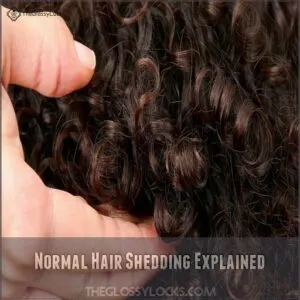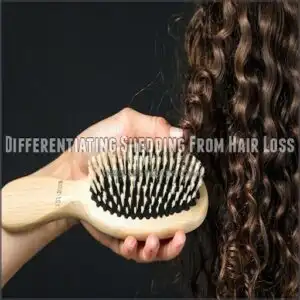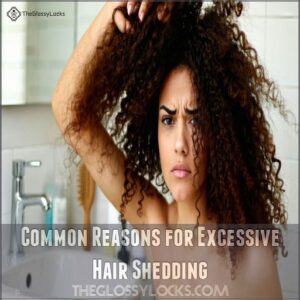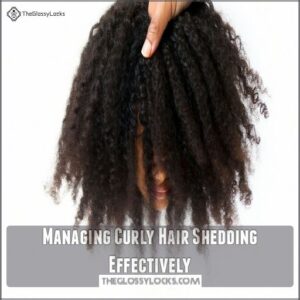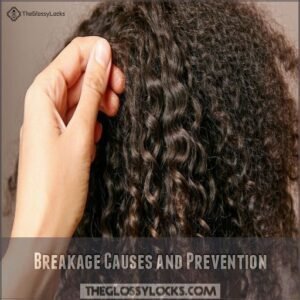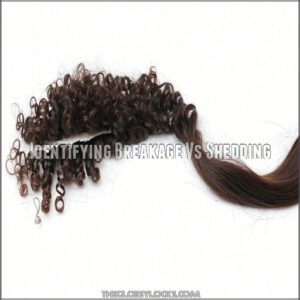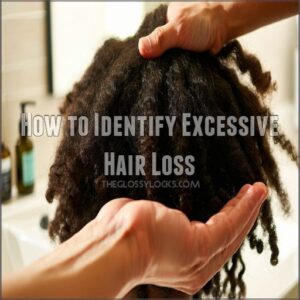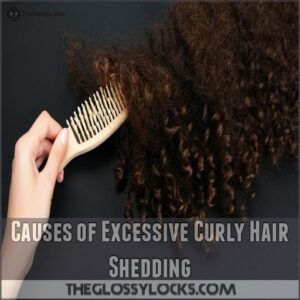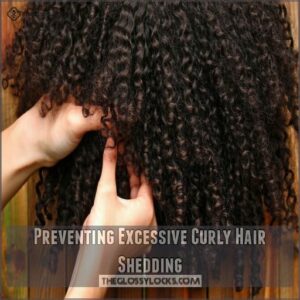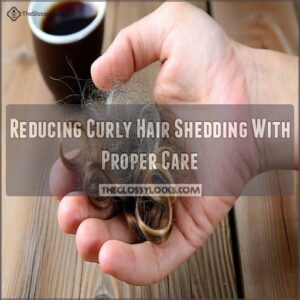This site is supported by our readers. We may earn a commission, at no cost to you, if you purchase through links.
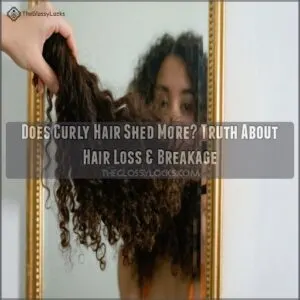 You might wonder if curly hair sheds more than other types, but fear not! Curly hair doesn’t shed more; it just likes to hold onto those fallen strands longer.
You might wonder if curly hair sheds more than other types, but fear not! Curly hair doesn’t shed more; it just likes to hold onto those fallen strands longer.
Generally, folks lose 50-100 hairs a day, but curls trap these strands until your next wash. So if you’re feeling like a hairy detective discovering a crime scene in your shower drain, it’s pretty normal.
Because stress and anxiety can cause hair loss, such as anxiety-related hair loss, Just make sure you differentiate between normal shedding and real hair loss. Remember, curls need a bit more love and gentle care. Curious about how to manage curly hair shedding more effectively? There’s more to learn!
Table Of Contents
- Key Takeaways
- Normal Hair Shedding Explained
- Does Curly Hair Really Shed More
- Differentiating Shedding From Hair Loss
- Common Reasons for Excessive Hair Shedding
- Managing Curly Hair Shedding Effectively
- Curly Hair Shedding Vs Hair Breakage
- How to Identify Excessive Hair Loss
- Causes of Excessive Curly Hair Shedding
- Preventing Excessive Curly Hair Shedding
- Reducing Curly Hair Shedding With Proper Care
- Frequently Asked Questions (FAQs)
- Does curly hair shed a lot?
- What could be the reason for continuous hair shedding?
- Why do curly hair shed more in the shower?
- Is it normal to shed more hair a day?
- Why do women shedding more if they have longer hair?
- Does hair texture affect shedding?
- Why does my hair fall out more when it’s curly?
- Is it normal for people with curly hair to lose a lot of hair in the shower?
- Does curly hair break more?
- Is curly hair weaker than straight hair?
- How does washing frequency affect curly hair shedding?
- Can seasonal changes impact curly hair shedding?
- Does hair texture affect shedding patterns in curls?
- What role do hormones play in hair shedding?
- How can scalp massages influence hair shedding?
- Conclusion
Key Takeaways
- Curly hair doesn’t actually shed more than straight hair; it holds onto fallen strands until wash day, making shedding seem more dramatic.
- You naturally lose about 50-100 hairs a day, and with curls, these strands can get trapped, appearing more during detangling.
- Differentiating between normal shedding and hair loss is crucial—look for a white bulb at the root, a sign of natural shedding.
- Maintaining curly hair health involves gentle detangling, using the right hair care products, and avoiding excessive heat styling.
Normal Hair Shedding Explained
Everyone naturally sheds about 50-100 hairs daily, which is a normal part of the hair growth cycle, and this is just your hair’s way of making room for new growth.
Wash day can be an exciting treasure hunt for lost follicles!
With curly hair, those shed strands can get trapped in your coils, making wash day an exciting treasure hunt for lost follicles!
Definition of Normal Hair Shedding
Normal hair shedding is like your favorite sweater losing a few threads—it’s just part of the deal.
Each hair strand plays its role in the hair growth cycle, where, eventually, they bow out gracefully.
But remember, curly hair has a knack for holding onto these stragglers, which can make typical hair shedding seem more dramatic.
Keep calm and detangle gently!
Average Daily Hair Loss
Your hair’s shedding about 50-100 strands daily is part of life’s natural rhythm. Imagine it’s like leaves falling from a tree—perfectly normal.
- Average daily hair loss: Around 50-100 strands
- Like a gentle autumn breeze
- Noticing patterns? Use a hair loss calculator
- Worried? Focus on hair loss prevention
- Trust in hair’s regrowth journey
Curly Hair and Trapped Shed Strands
So, you lose about 50-100 hairs daily—that’s totally normal!
But with curly hair, those shed strands get tangled up, making wash day feel like a major hair shedding event.
Using a gentle curly hair detangler tool from a great detangling product can help minimize breakage.
It’s a sneaky illusion; you’re not actually losing more hair.
Think of your curls as tiny hair traps.
Smart detangling with the right curly hair products helps.
This is one of many curly hair shedding myths.
Does Curly Hair Really Shed More
Curly hair myths can make you wonder, does your curly mane shed more than straight hair? Well, let’s set the record straight.
While it might seem like you’re losing more hair, especially in the shower, it’s not the curls shedding excessively.
The coiled nature of curly hair tends to trap shed strands, which means they don’t simply fall to the ground throughout the day.
Additionally, genetics, stress, and diet can also play a role in understanding 4c hair shedding.
When you finally wash or comb through your curls, it might feel like a lot is coming out at once.
Relax, your curly hair’s shedding rate is pretty standard, ranging from 50-100 strands per day.
Keep those hair care routines in check, focus on stress management, and you’ll have fewer worries about shedding curly hair.
Differentiating Shedding From Hair Loss
Understanding the difference between normal hair shedding and hair loss can save you a lot of unnecessary worry, especially when you notice a few extra strands in your brush.
Look for a white bulb at the root of shed hairs as a comforting sign of normal shedding.
Consult a professional if you spot alarming bald patches.
Normal Shedding Characteristics
Imagine a garden: each season, leaves fall to make way for new growth.
Similarly, your hair goes through phases—the hair cycle.
Shedding 50-100 strands a day is normal, as your follicles are in various growth stages.
1. Look for a white bulb at the root, 2. expect some strands trapped in curls, 3. and remember, it’s natural!
Hair Loss Warning Signs
Noticing unusual shedding or thinning patches in your curly mane?
Keep an eye out for hair loss warning signs like sudden scalp changes, altered hair texture, or distinct hair loss patterns.
These shifts might hint at hair loss causes needing attention.
Feeling like your curls aren’t bouncing back? It’s time to chat with a pro for peace of mind.
Presence of White Bulb at Root
Spotting a white bulb at the root of your fallen strand? That’s usually a sign it’s part of the shedding process, not hair loss.
Think of it as nature’s way of clearing space for fresh strands.
Hair growth is a natural cycle influenced by factors like scalp health and hair follicles, which can be supported by home remedies for hair growth, natural oils and masks. Like trees losing leaves in autumn, hair naturally follows a growth cycle.
Knowing your hair’s stages might just put your mind at ease about curly hair shedding.
Consulting a Professional
You’ve spotted a white bulb at the root, but still concerned? It’s time to consult a professional. A trichologist can offer insights into:
- Hair loss diagnosis and treatment. Understanding the underlying causes, such as male pattern baldness triggers, is crucial in determining the best course of action
- Scalp health check to pinpoint issues
- Dermatologist visit for deeper analysis
- Customized hair loss treatment plans
- Expert advice on curly hair shedding
Set your mind at ease!
Common Reasons for Excessive Hair Shedding
So, you’re noticing more hair in your brush than usual?
Let’s explore some common culprits behind excessive shedding, like hormonal shifts (think childbirth!), stressful periods, illnesses, or even nutritional deficiencies—it’s often a combination of factors, so don’t panic!
Hormonal Changes and Childbirth
After childbirth, you’re likely to experience postpartum hair loss due to hormonal fluctuations, and this shedding typically peaks around 4-5 months after birth as hormonal changes cause hair loss.
It’s like your hormones decided to throw a farewell party, shedding strands as souvenirs.
Fear not, though! Hair growth after birth typically resumes, restoring volume over time.
If curly hair shedding patterns persist, check thyroid hormones or consult a professional to make sure everything bounces back smoothly.
Stress and Sickness
Stress and sickness can sneak up on you like an unexpected rainstorm.
They impact your hair shedding patterns, leaving more strands behind.
Here’s what you might notice:
- Anxiety spikes: Causes stress-related hair loss.
- Illness strikes: Leads to temporary shedding.
- Recovery phase: Hair begins to regrow, albeit slowly.
Remember, it’s perfectly normal.
Nutritional Deficiencies and Diet
Your diet plays a big role in hair shedding.
Lacking vitamins and nutrients can make your curls shed more.
Think of it like watering a plant—without the right nutrients, growth stalls.
Make sure you’re eating a balanced diet rich in iron, zinc, and vitamins A, B, C, and D.
Feed your body, and your hair will thrive!
Environmental and Hereditary Factors
Imagine this: your hair’s delicate dance with the elements.
Pollution and climate can tangle up your curly hair’s shedding patterns, intensifying the natural shedding rate.
Genetics plays its part too—thanks, Mom and Dad!
Just like a mystery novel, the plot thickens with diet and stress.
While it’s common, understanding curly hair shedding vs straight helps keep the mystery in check.
Managing Curly Hair Shedding Effectively
Keep your curls happy and your shower drain less clogged by eating a balanced diet and using gentle detangling techniques.
Say goodbye to excessive shedding by opting for curly-specific products and skipping the daily heat styling for a change.
Balanced Diet and Hair Growth
Think of your hair as a garden, needing the right nutrients to bloom.
To support hair growth, focus on foods rich in vitamins like leafy greens, nuts, and fish.
A balanced diet isn’t just a ticket to better health, but also to fewer curly hair shedding woes.
Don’t let nutrient deficiencies turn your mane into a shedding tree!
Gentle Detangling Techniques
Eating right fuels healthy hair growth, but gentle detangling is equally important.
Imagine your curls as delicate vines; you wouldn’t yank them, right?
Use wide-tooth combs or detangling brushes.
Finger detangling works wonders, too.
Section your curly hair before you start.
Prevent knots by regularly conditioning and avoiding harsh brushing.
Remember, less is more in terms of detangling.
A little patience goes a long way in preventing breakage and hair shedding.
Hair Care Products for Curly Hair
You’ve probably noticed that curly hair needs specific TLC.
Enter sulfate-free shampoos, curl creams, and leave-in conditioners—your curly hair squad.
These hair care products lock in moisture and help keep hair shedding manageable.
Hair oils and styling gels are like best friends, giving curls definition without guilt.
Choose wisely, and your curls will reward you with bounce and flair!
Minimizing Heat Styling and Chemicals
Now that you’ve got the right products for your curly hair, let’s chat about sidestepping heat styling risks and chemical damage.
Embrace low-heat alternatives that nourish without harm:
- Go natural: Try simple, heat-free styles.
- DIY masks: Whip up hair-boosting masks at home.
- Avoid breakage: Ditch harsh treatments and save those strands.
Enjoy your curls’ natural bounce and shine!
Curly Hair Shedding Vs Hair Breakage
When you find strands of hair on your brush, it can be tricky to tell if it’s shedding or breakage to blame.
Don’t worry—understanding the difference isn’t as complicated as your last detangling session!
Breakage Causes and Prevention
Curly hair, like a treasure map of secrets, can puzzle you with breakage.
Blame dry hair, tight hairstyles, or harsh heat styling for snapping strands.
Additionally, over-brushing and rough towel-drying can lead to split ends, so consider using hair breakage masks to help strengthen hair strands.
| Causes | Prevention |
|---|---|
| Dry Hair | Moisturizing Products |
| Heat Styling | Low-Heat Techniques |
| Tight Hairstyles | Gentle Detangling |
Use gentle hair products to boost hair health and reduce breakage.
Identifying Breakage Vs Shedding
Spotting the difference between hair shedding and breakage can seem tricky, but it’s doable with a keen eye.
Hair shedding is part of a natural cycle, while breakage reveals itself as split ends or sudden changes in hair texture.
If strands snap mid-length, suspect damage.
Embrace gentle care; avoid tight hairstyles and heat to nurture healthy hair growth.
How to Identify Excessive Hair Loss
Recognizing excessive hair loss can feel as tricky as finding that one sock that always vanishes in the wash.
Excessive hair loss can be a sign of a larger issue.
If you notice significant thinning, unusual shedding patterns, or changes in your hair’s texture, it’s time to think about seeking advice from a hair care professional.
Thinning Hair and Baldness Signs
Hair breakage and shedding are different beasts, but thinning hair is a red flag.
Noticeably less hair on your brush? Part your hair and see wider spaces between strands? These are signs of hair thinning, a potential early stage of hair loss.
Don’t panic; many things cause thinning, from stress to genetics.
If you’re worried, chat with a doctor or dermatologist. They can help you figure out what’s going on and suggest solutions, like exploring hair transplant options if needed.
Abnormal Shedding Patterns
When you notice abnormal shedding patterns, it often feels like your hair’s staging a mini rebellion. Does stress or a hectic diet play a part?
- Keep an eye on increased hair in the shower drain.
- Check for thinning spots that seem more visible.
- Notice if your hair products cause itchiness or scalp issues.
- Understanding the hair growth cycle is key, as changes in it can be influenced by various factors such as genetics, aging, or alopecia causes and statistics. Remember, medications or scalp health changes can impact the hair growth cycle.
Changes in Hair Texture
Curly hair can change texture over time, shifting from bouncy spirals to looser waves.
Using the right products, such as those found in a curl defining cream, can help prevent this shift.
If you notice your curls losing their snap, it might hint at excessive hair loss or damage.
Keep an eye out for sudden shifts and make sure you’re using the right hair care products.
Hydration is key—nurture those curls, and they’ll keep bouncing with life.
Causes of Excessive Curly Hair Shedding
If you’ve noticed more curly locks in your brush lately, you might blame seasonal changes or your love of tight hairstyles for the extra shedding.
Curly hair has a knack for getting dry and missing out on moisture, which can also lead to increased hair loss—just like that time you forgot to water your houseplants.
Seasonal Changes and Hormones
Seasonal hair cycles can feel like a wild ride.
Just as trees lose leaves, your hair might shed more in winter, only to enjoy a spring growth spurt.
Hormonal fluctuations, like those from stress or changes in your life, can impact curly hair shedding.
Don’t fret—understanding hormones and their quirks gives you control, reducing hair loss worries.
Dry Hair and Lack of Moisture
Tackling dry hair starts with understanding its thirst for moisture.
Imagine your curly locks like a wilting plant craving water.
A lack of hydration can make hair shedding feel more like hair loss.
Embrace moisturizing products and hydrating hair masks to revive those curls.
Deep conditioning acts as the rainstorm your hair’s been waiting for, nourishing every strand.
Tight Hairstyles and Traction Alopecia
Pulling your hair too tightly into styles like braids may lead to traction alopecia, resulting in hair loss.
It puts excessive strain on your scalp and hair, potentially causing breakage.
To combat this, you can try using products from popular hair growth collections Hair growth products.
To keep your curly hair healthy, choose looser protective styles.
Mix up your look and give your scalp a breather—think of it as a mini-vacation for your hair!
Preventing Excessive Curly Hair Shedding
Let’s face it, dealing with curly hair can feel like a never-ending battle, but preventing excessive shedding doesn’t have to be a hair-raising experience!
By focusing on a gentle clarifying routine, minimizing heat styling, and nourishing both your hair and body from the inside out, you can keep your curls healthy and thriving.
Clarifying and Conditioning Routine
You might feel like your curly hair‘s shedding faster than autumn leaves.
A well-defined conditioner frequency, such as using leave-in conditioner once a week, can help lock in moisture and reduce frizz.
To manage it, a wash day routine with clarifying shampoo can unclog hair follicles and reduce buildup.
Pair this with a deep conditioning routine to nourish strands and enhance scalp health.
The conditioner benefits are magical, making hair stronger while fighting hair loss and shedding.
Detangling and Low-Heat Styling
In the realm of curls, how you detangle is key.
Use the right detangling tools and keep hair damp—your curls will thank you.
For styling, lean into heatless or low-heat methods.
Think about low-manipulation styles that protect your curl pattern.
It’s like dressing your hair in cozy layers, with styling products adding the perfect touch.
Nourishing Your Body and Hair
Just like a car needs fuel, your hair needs nourishment to thrive.
Boost your diet with healthy fats, proteins, and vitamins to fuel hair growth.
Picture proteins as the bricks laying a strong foundation, while healthy fats act like a glossy topcoat.
Hydration keeps your hair’s bounce alive.
Remember, caring from the inside complements gentle detangling outside.
Reducing Curly Hair Shedding With Proper Care
To keep your curly hair shedding to a minimum, focus on adopting proper care techniques that nurture your curls.
Protective styling and using silk pillowcases are two important techniques.
Prioritizing moisture is also essential.
Protective Styling and Hair Care
Wondering how to keep those curls happy and healthy? Protective styling is your secret sauce. It’s like giving your hair a vacation from all the tugging.
Simple styles help prevent breakage, while regular moisturizing techniques help your curls stay nourished.
Trimming every few months can boost scalp health and reinforce hair care—keeping shedding at bay!
Silk Pillowcases and Hair Accessories
You know what could make a nightly difference? Silk pillowcases! They gently cradle your curls, reducing friction and hair breakage.
For more curly hair care tips, try the Pineapple Method.
Toss the cotton pillow away and let silk do its magic. Add satin scrunchies to your routine, and you’re fighting off hair shedding while you sleep.
Sleep tight and wake up with curls ready to conquer the day!
Prioritizing Moisture and Deep Conditioning
Deep conditioning is your curly hair’s best friend—think of it as a spa day for your strands!
Regular deep conditioning treatments, along with a solid moisturizing routine, are key to preventing breakage and shedding.
Look for products packed with moisture-boosting ingredients.
A weekly hair mask is a great addition to your hydration routine, greatly improving moisture retention.
These simple steps will leave your curls happy, healthy, and less prone to shedding.
Frequently Asked Questions (FAQs)
Does curly hair shed a lot?
Imagine untangling a ball of yarn—curly hair shedding can feel similar.
While curly hair doesn’t shed more, its texture traps loose strands, making it seem more.
Regular care and detangling help keep things manageable.
What could be the reason for continuous hair shedding?
Continuous hair shedding can stem from factors like stress, hormonal changes, medications, or inadequate nutrition.
Balancing your diet, reducing stress, and consulting a healthcare professional can help identify and manage the underlying causes effectively.
Why do curly hair shed more in the shower?
Curly hair tends to shed more in the shower because the coiled strands trap shed hairs, releasing them during washing.
It might seem excessive, but it’s just those lingering strands finally making their grand exit.
Is it normal to shed more hair a day?
Losing a few threads daily is part of life’s tapestry.
Expect to shed 50-100 strands each day as your scalp’s natural cycle continues.
If you’re seeing more, it might just be tangled up in curls.
Why do women shedding more if they have longer hair?
Longer hair simply means more strands to see.
It’s like having a bigger garden – more flowers to admire, more leaves to rake.
Normal shedding‘s still about 50-100 hairs daily, regardless of length.
Does hair texture affect shedding?
Hair texture can fool you about shedding.
While textures like curly hair trap loose strands, making it appear more, the actual amount shed daily stays consistent regardless of texture.
It’s not about more, just what’s hidden.
Why does my hair fall out more when it’s curly?
When your hair’s curly, it seems to shed more because curls trap strands that naturally shed daily.
On wash days, you’ll notice more hair coming out, but it’s usually just accumulated normal shedding.
Is it normal for people with curly hair to lose a lot of hair in the shower?
Absolutely, it’s normal for curly hair to seem like it’s shedding more in the shower.
Those spirals tend to trap shed hairs, releasing them all at once on wash day.
No worries—you’re just seeing the backlog!
Does curly hair break more?
Curly hair can break more easily due to its coiled structure.
Curly hair needs extra care to prevent damage.
It needs extra care to prevent damage, like moisturizing regularly and gentle detangling.
Handle your curls with love and avoid excessive heat styling.
Is curly hair weaker than straight hair?
You might think curly hair is weaker, but it’s just more prone to breakage due to its unique structure.
Think of it like a fragile yet resilient twisty straw – it bends, but can snap if mishandled.
How does washing frequency affect curly hair shedding?
Too much of a good thing can be bad, right? Washing too often strips natural oils, potentially increasing shedding. Aim for 1-2 washes a week; your curls will thank you!
Can seasonal changes impact curly hair shedding?
Seasonal changes can trigger more curly hair shedding due to temperature and humidity shifts, which affect your scalp’s health.
It’s like your hair has its own “spring cleaning,” shedding extra as conditions change.
Does hair texture affect shedding patterns in curls?
Imagine curly hair as a catcher’s mitt, snagging more shed strands than straight hair.
Hair texture doesn’t actually change shedding rates, but curls can make normal shedding look more intense, creating an illusion of greater loss.
What role do hormones play in hair shedding?
Hormones, especially during pregnancy, menopause, or puberty, can seriously crank up hair shedding.
This cycle is especially relevant when it comes to conditions like telogen effluvium, which can cause temporary chaos before the new growth phase. Think of it like nature’s way of shaking things up—temporary chaos, then the new growth phase.
Keep calm, it’s often reversible.
How can scalp massages influence hair shedding?
Feeling like your hair’s jumping ship?
Scalp massages might be the soothing anchor you need.
They boost circulation, helping nourish hair follicles.
Plus, they’re a delightful excuse to hit pause and pamper yourself.
Conclusion
Like a trusty map guiding you home, understanding your curly hair shedding makes it easier to manage.
Curly hair doesn’t shed more than other types; it just holds onto strands longer.
If you see a few extra hairs in the shower, it’s likely just trapped strands finally breaking free.
Remember, gentle care, proper nutrition, and the right products are your allies in keeping your curls healthy.
Know the signs, and don’t hesitate to consult a pro if needed.

